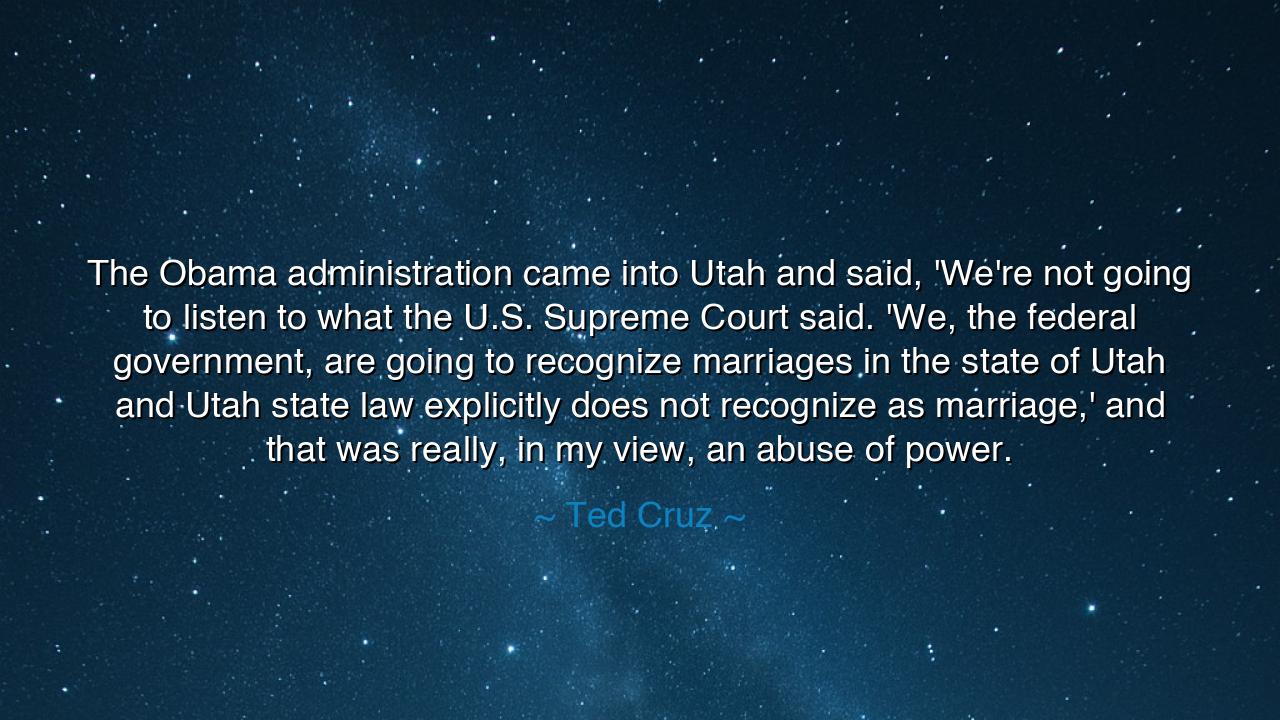
The Obama administration came into Utah and said, 'We're not
The Obama administration came into Utah and said, 'We're not going to listen to what the U.S. Supreme Court said. 'We, the federal government, are going to recognize marriages in the state of Utah and Utah state law explicitly does not recognize as marriage,' and that was really, in my view, an abuse of power.






“The Obama administration came into Utah and said, ‘We’re not going to listen to what the U.S. Supreme Court said. We, the federal government, are going to recognize marriages in the state of Utah and Utah state law explicitly does not recognize as marriage,’ and that was really, in my view, an abuse of power.” — Ted Cruz
In this declaration, Ted Cruz speaks from a place of deep conviction about the nature of law, sovereignty, and the eternal struggle between power and principle. His words echo the timeless warning of history — that even noble causes can be corrupted if they abandon the sacred order of law. To Cruz, the abuse of power is not defined by motive but by method. Whether one agrees with the goal or not, when the authority of law is cast aside for political desire, the foundation of justice trembles. He reminds us that power must always bow to principle, for once power stands above it, tyranny begins to grow in silence.
The state of Utah, in this moment of controversy, became the battlefield of a larger philosophical war — not merely about marriage, but about the limits of federal might and the sanctity of state sovereignty. Cruz invokes the ancient belief that government exists not to create truth, but to guard it. He speaks as one who fears that when a government declares itself above the rulings of its own courts or the laws of its own states, it forgets that it, too, is bound by the Constitution — the covenant that grants it legitimacy. To him, the issue is not love or equality, but authority and order, for civilization survives only when its rulers respect the boundaries that bind them.
History offers countless mirrors to this dilemma. In the days of the Roman Republic, when Caesar crossed the Rubicon, it was not an act of war against men, but against law itself. The Senate had not permitted his armies to enter; yet Caesar, believing his cause just and his vision greater, defied the Republic’s order. Rome cheered in the moment, but within a generation, the Republic had died, and emperors ruled in its ashes. Ted Cruz’s warning carries that same ancient lesson: that even when authority acts for what it calls the “greater good,” it must never usurp the structure that preserves freedom.
To the modern ear, such concerns may sound rigid, even cold. But the ancients knew that justice is not a river of emotion — it is a pillar of reason. When governments begin to bend the law to serve their cause, no matter how virtuous they claim to be, they set a precedent for others to do the same in darker times. The federal recognition of marriages in Utah, though hailed by some as progress, was seen by Cruz as an omen — not of love’s triumph, but of the law’s erosion. For if the rule of law can be ignored in the name of compassion today, it can be ignored in the name of cruelty tomorrow.
Still, in every age, power and principle clash like the tide against the cliffs. The Supreme Court, the states, and the federal government are bound together in an uneasy harmony, each designed to check the other so that no single hand may close around the throat of liberty. Cruz’s cry is a reminder that this balance is fragile — that once we allow expedience to outweigh restraint, the republic itself begins to sway. His words may seem stern, but they are born of reverence for the order that makes freedom possible.
There is, too, an emotional undertone in Cruz’s lament — the sorrow of one who sees faith in institutions waning. The law, he implies, is sacred not because it is perfect, but because it restrains imperfection. It provides a path through the wilderness of human passion, ensuring that change, when it comes, arrives not through decree, but through consensus and process. To abuse power, even for justice’s sake, is to plant seeds of mistrust that will one day choke the tree of liberty.
Let this teaching be passed to future generations: never trade the rule of law for the thrill of victory. For when law dies, freedom soon follows. Progress must be built not upon defiance but upon discipline; not upon the whims of the moment, but upon the wisdom of enduring principles. Whether one stands with Cruz or against him, the lesson remains: that in every age, the challenge of leadership is not only to do what is right, but to do it rightly — within the bounds of order, humility, and respect for the divine covenant of justice that keeps the world from falling into chaos.






AAdministratorAdministrator
Welcome, honored guests. Please leave a comment, we will respond soon